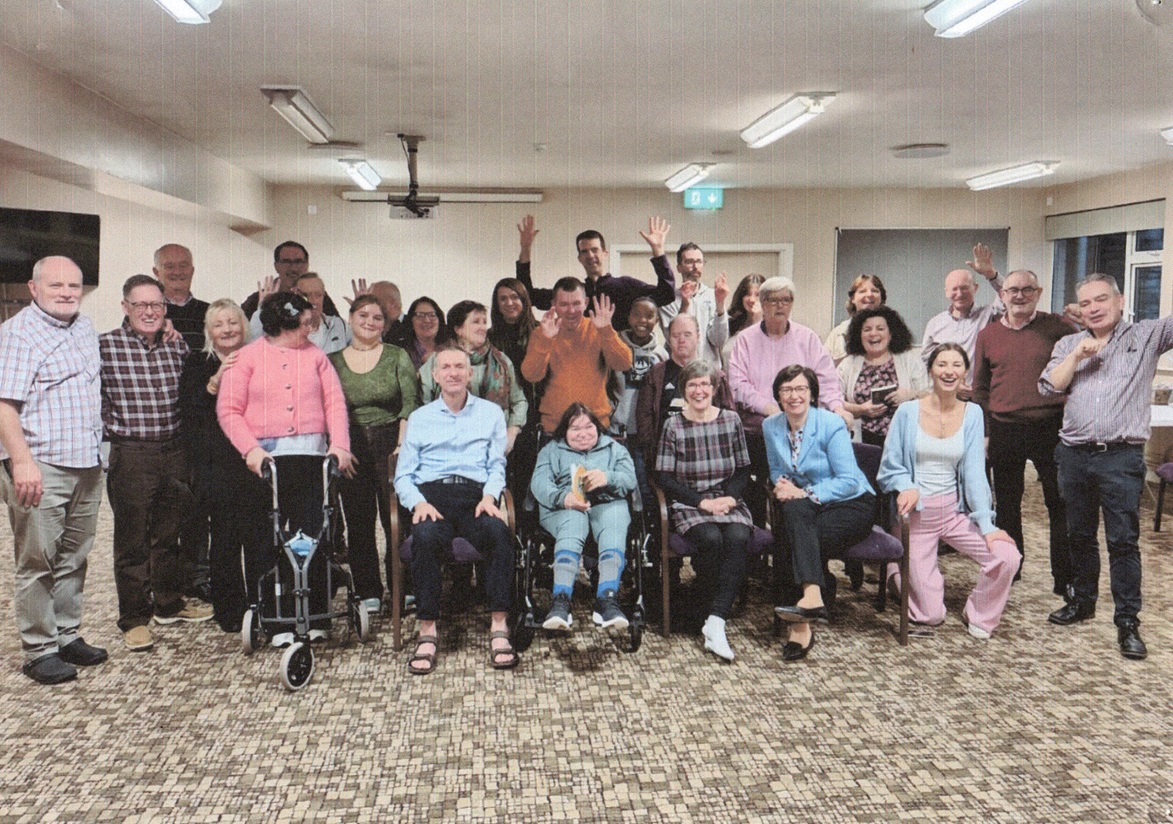
One of many things I’ve had to get used in my new job at L’Arche Ireland is having two phones!
To its credit, my Irish phone doesn’t give me constant notifications of the latest emails or WhatsApp messages or remind me of what I was doing on this day five years ago! My UK phone seems to like doing that, and to be fair, the pictures it gives me from five years ago can be a nice reminder. My UK phone is quite new and so, whilst being a far cry from the smartest smartphones on the market now, is pretty darned smart! I had to get a new one because a few months ago, when on pilgrimage to Walsingham, I took a short cut across what looked to be a shallow river and ended up waist deep in water and my phone (which I’d been using for navigation) had been in my pocket! When I eventually got to the other side I checked the phone to see exactly where I was and found to my horror that it was dead!
How reliant, how dependent we have become on our phones. How did we live without them, we ask ourselves? How did we make arrangements with our friends to meet up in town at the weekend? How did we know what the weather was like? How did we take photos? How did we get the news? How did we listen to music? How did we find which way to walk when on pilgrimage? (and remember, people have been going on pilgrimage for hundreds of years). How did we pray even? I must confess on this theme that I really like ‘Sacred space,’ the online site run by the Irish Jesuits.
How on earth did we survive without our smartphones? But should we also now be asking, how will we survive with our smartphones. A lot of worrying research is coming to light. Three recent examples are: if you have your phone next to your bed you are less likely to have a peaceful night’s sleep; the younger a child receives a smartphone, the higher the risk of them developing mental health issues when they are older; and young people check their phone on average eighty-three times a day. And that is not even to mention the online bullying, the trolling, the deceptions that are making the lives of many people, especially young people, a misery and even leading to suicide; or simply that constant pressure we seem to feel now to be online, all the time.
I’m not at all surprised by the eighty-three times a day statistic, and whilst I’m nowhere near that figure myself I have to admit that I’m having a sneaky peep at the screen rather more often than I ever thought I would. I was back in Canterbury recently, and whilst cycling through the university campus I passed about twenty students at a bus stop. Every single one of them was glued to their phone. Then on an early morning walk I passed two young men coming the other way. Both had their heads down, moving their thumb across the screen on their phone: apparently oblivious to me, to the birds singing in the hedgerow, to the sun starting to rise.
What did we used to do, I wondered, when we stood at a bus stop, or when we went for a walk? Maybe nothing much at all, and I’m convinced that we all need a certain amount of time to do nothing much at all, for our wellbeing and for our creativity.
What kind of a world have we created, I mused plaintively to a friend over tea? With developments in IT and other technology we thought we would have more leisure time, more time to do nothing much at all. And what have we done? We’re created devices which seem to have done the opposite, so that we feel we need to be ‘connected’ and doing something or saying something or responding to something 24/7.
I know I can’t turn back the tide of technology any more than the Luddites of the 19th Century could halt advances in the English textile industry by smashing up the new machinery which would lead to greater productivity but also take away jobs. There are so many situations now where I really do have to use a smartphone whether I like it or not. And like any technology, it can be used for good or for ill. The challenge perhaps is how not to be complete slaves to our phones, and to retain some freedom and awareness around their use.
And turning to the title of this piece, and as we enter another season of Lent, what, I wonder, would Jesus have done with his smartphone if he had been going off into the desert for forty days in 2024?
He would probably have been tempted to take it with him. He was human, after all, as well as being divine. Ah, sure there might be an important message, he might have surmised. Or, like me, he might fancy having a little peep at ‘Sacred space’ or listen to some Taizé chants to get him in the mood for prayer. And then maybe, while he was on Youtube, he could just see a few of the goals from the previous week’s Premier League matches. A little bit of celebrity gossip? Hey, where’s the harm in that? We all need our bit of escapism, don’t we? You can’t be praying all the time.
And then, I like to think, the battery would run out on Jesus’ smartphone and that he would take a deep breath and feel perhaps a tinge of panic but then relief. And that he would walk further into the desert, where he would still face temptations: for power, prestige, acclaim. Temptations, big or small, will always be there. But perhaps, without the distraction of the phone, he could now face those temptations full on, and a little bit more aware and prepared.
I like to think as well that, without the constant pinging of that phone, Jesus would be a little bit more conscious of what was around him; for deserts can be bleak but they can also be places of beauty. And I like to think that he would take heart in the words of Isaiah (C. 35):
The desert and the parched land will be glad. The wilderness will rejoice and blossom. Like the crocus, it will burst into bloom. It will rejoice greatly and shout for joy.
I think I’m stuck, for the time being, with my two phones but I hope that during this season of Lent I might have a bit more freedom around their use so that I can be a little better prepared for whatever battles I will have to face with the devil, and so that I can be a little more able to see the incredible beauty in what can appear at times like a bleak world.
Eddie Gilmore


T. +353 (0)56 7755494
E. admin.central@larche.ie
L’Arche Ireland
‘An Siol’, 42 West Street
Callan,
Co. Kilkenny
R95 E368
